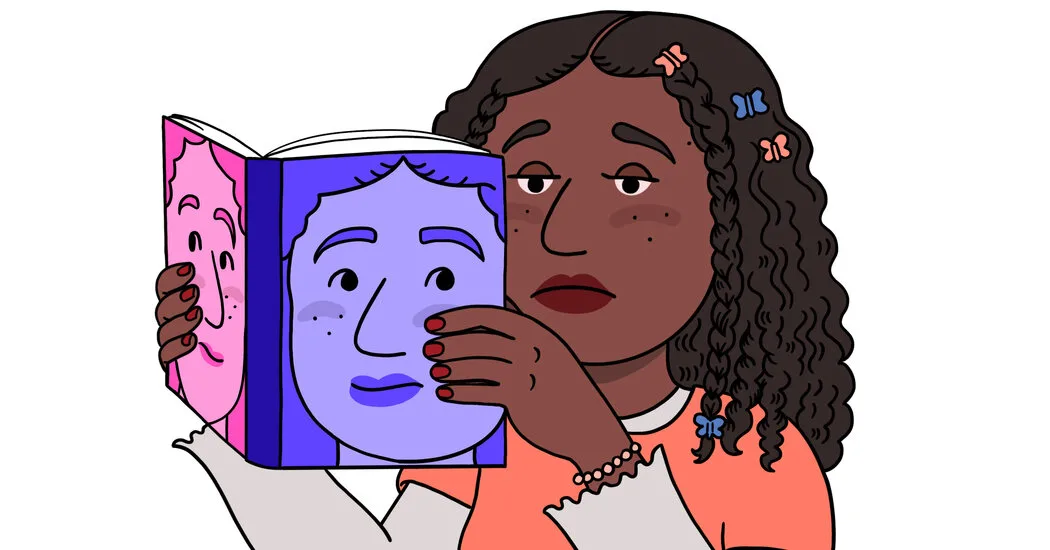
Nic Stone, the author of “Dear Martin,” “Chaos Theory” and more, recommends some of her favorite young adult books about mental health.
I was 14 years old when I experienced my first mental health crisis. Things were tricky at home, and I was deeply overwhelmed with emotions that I didn’t have the space or language to express. As a result, I developed an anxiety disorder. Anxiety begot depression, and there came a night when I just didn’t want to deal anymore.
I’m still here, obviously, and I’m thankful. I’m also thankful that I’ve since learned the terms I used above — “anxiety disorder” and “depression” — and am able to apply them both in hindsight. However, at 14, when I most needed to understand what was going on with me, I lacked access to the information that would have been helpful.
Fortunately times have changed, and as a society, we’ve gotten better at acknowledging, discussing and providing resources for those struggling with their mental well-being. But even still, grappling with one’s mental health can feel confusing and isolating.
Which is where books come in. Fiction gives teens — and the adults who love and care for them — insight into the experience of mental health challenges. It can help teens learn more about what they’re dealing with; it can reveal the personal elements of what may otherwise seem clinical; it can help teens who are struggling feel less alone.
If you’re looking for a book to open up conversations about teen mental health, here are six powerful and deeply human young adult novels that I couldn’t recommend more highly.
We Are All So Good at Smiling, by Amber McBride
This gorgeous novel in verse opens with a very harsh reality: Whimsy, a Black teenager, is being hospitalized for suicidal ideation. Then the story takes a magical realist turn, depicting Whimsy’s recovery as a journey into a fairy-tale garden to help a Fae friend. It’s through this fanciful framing that McBride shares visceral insights into the experience of deep clinical depression. As a person living with major depressive disorder, I found reading this beautiful book to be one of the most validating experiences of my life.
Highly Illogical Behavior, by John Corey Whaley
“Highly Illogical Behavior” peeks into the life of an agoraphobic teenager, Solomon Reed, who hasn’t left his house in three years. But Solomon’s world is flipped when a girl decides she’s going to come in. This novel helped me better understand my own fear of, well, being afraid. The book also takes a searing look at how relationships impact mental stability or instability, and raises the idea that it’s possible to do more harm than good when trying to “help” someone with a psychiatric disorder.
The Weight of Our Sky, by Hanna Alkaf
Set during the 1969 race riots in Kuala Lumpur, Malaysia, this novel follows a young woman dealing with obsessive-compulsive disorder as she searches for her mother amid social and political strife. All the elements of this book — from the plotting to the voice to the masterly use of figurative language to the specific historical lens — come together to form a smart and sharp story about a mind overrun by intrusive and uncontrollable thoughts.
Challenger Deep, by Neal Shusterman, illustrated by Brendan Shusterman
Schizoaffective disorder is one of the most deeply misunderstood and mischaracterized mental illnesses. Which makes this masterwork — about a high school student named Caden’s psychotic break, which he experiences as a descent into the deepest part of the ocean — not only a must-read, but a must-read-repeatedly. The author is open about his son Brendan (who illustrated the book) inspiring the novel, and that familial care and compassion comes through these pages. This book will work itself into your bones and leave you forever changed.
Wintergirls, by Laurie Halse Anderson
This novel follows a young woman named Lia who is working through an intense struggle with mental illness and self-harm after she loses her best friend to anorexia, an eating disorder she’s also struggling to overcome. “Wintergirls” thoughtfully examines the psychological underpinnings that lead to extreme food control, while also highlighting its dangers — this book never glorifies diet culture or disordered eating. Additionally, the writing is chock-full of beautiful figurative language and pulls no punches when it comes to the narrator’s sense of urgency. This novel is near impossible to put down.
Anger Is a Gift, by Mark Oshiro
This is one of my favorite Y.A. books of all time. The novel follows Moss, a gay Black teenage boy who develops recurring panic attacks following the death, and the subsequent widespread victim-blaming, of his father after he’s killed by a police officer. This is a gem that shows both the impact of extreme anxiety after a tragedy and also the power of getting acquainted with, and leaning into, our emotions as fuel for bringing about change.
Nic Stone is the author of several young adult novels, including “Dear Martin” and “Odd One Out.” Her latest book is “Chaos Theory.”

